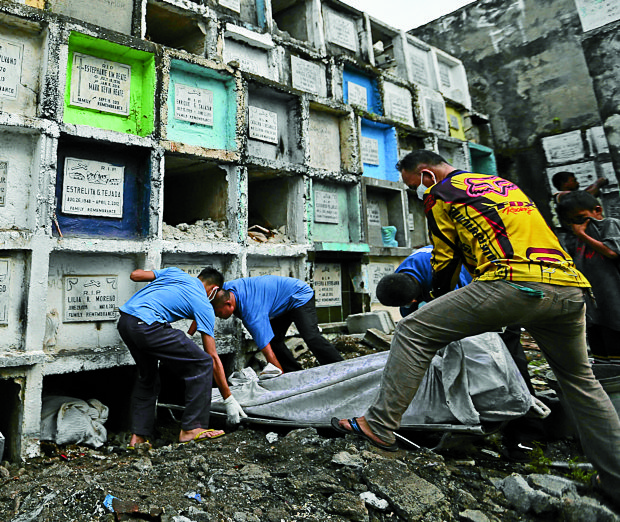We have no fear, says hit man in drug war

MASS BURIAL Thirteen victims of executions in the campaign against illegal drugs are buried one on top of the other in tombs at the public cemetery in Navotas City in this photo taken on Jan. 24. —RAFFY LERMA
“We have no fear, nor does it bother our conscience, when we kill these people,” the hit man says.
The confessed hit man defends the extrajudicial killings in President Duterte’s war on drugs and takes the leader’s encouragement and promise of protection as his license to kill.
He is the latest to admit participation in the killings, and explains why in a video documentary released by The New York Times on Monday.
War on drugs
“When a President Says, ‘I’ll Kill You,’” by Emmy winner Andrew Glazer and Jeremy Rocklin, is a 15-minute trip to the inner cities of Metro Manila with stops at dimly lit alleys and roads littered with the bodies of the victims of Mr. Duterte’s war on drugs, and at makeshift homes where the victims’ families wail in pain and demand an answer to the same question, “Why?”
The documentary follows Inquirer photojournalist Raffy Lerma on his nightly dashes to crime scenes, images from which have become familiar to Filipinos since Mr. Duterte came to power.
Article continues after this advertisementLerma’s picture of a woman cuddling the lifeless body of her husband, published on the front page of the Inquirer on July 24 last year, helped call the world’s attention to human rights violations in the Philippines under Mr. Duterte.
Article continues after this advertisementMr. Duterte, in his first address to a joint session of Congress, dismissed the picture as “dramatics.”
The documentary tracks the killings from the day Mr. Duterte became President.
That was June 30 last year and Mr. Duterte, who during the campaign swore to kill tens of thousands of criminals and dump their bodies in Manila Bay, is shown bowing deeply to the nation before taking his oath of office at his inauguration.
Death threats
Then follows a series of clips from different occasions showing Mr. Duterte warning drug users and peddlers that he will kill them.
“It is never wrong for a President, the police or the military to protect its citizens,” Mr. Duterte says at a gathering of policemen.
In one audio clip, Mr. Duterte gives marching orders to policemen: “I want you to hunt them down and if you cannot arrest them without putting your life in jeopardy then kill them and I will protect you.”
The hit man, wearing a bandanna and a mask, defends the killings.
“We kill people who are a menace to society,” he says. “As the cliché goes, it’s up to heaven what happens to us. But we do believe we are taking out the really bad people.”
The hit man takes Mr. Duterte’s words as a shield against arrest and prosecution.
“I think, what I gather from what he’s saying is that, if we are caught, we will be freed,” he says.
Tragic scenes
With Mr. Duterte’s threats—thrown during almost all of his public appearances—taking the place of a dirge, a series of images follows: bodies sprawled on dimly lit roads or under a bridge; crime scene investigators examining pools of blood; trash bags containing bodies kept from spilling out by packaging tape; body bags being zipped up to be taken away; crying children following the hearse carrying the coffin of a slain father, brother or friend.
“The President promised this. He promised that people would die. I am for the drug war, I want drugs to stop. But I’m not for the killings,” Lerma tells an interviewer.
“There’s injustice going on around the country. And you begin to feel maybe we’re just starting,” he says.
Mr. Duterte has said the war on drugs would not stop until the last drug lord or pusher or user has been taken out.
Some groups have estimated that more than 8,000 people have been killed by police and mysterious gunmen since Mr. Duterte launched the antinarcotics crackdown after taking office last year.
He says he will press his war on drugs up to the last day of his six-year term.
‘3 million addicts’
In that case, nearly a million people could die.
Mr. Duterte’s speech last year in which he compared himself to Hitler is featured in the documentary.
“Hitler massacred 3 million Jews. There are 3 million addicts in the Philippines. I’ll be happy to slaughter them,” Mr. Duterte says.
Lerma believes a large number of deaths is not unlikely.
“The numbers are now, five months in, 5,000? So just add them up. After six years, what would the number be?” he says.
A clip shows a crime scene investigator peeling off a cardboard sign taped to a body.
“Pusher. Don’t follow,” the sign says.
Such signs are left on or near bodies to indicate the victims have been taken down by hit men and not killed by police, who dispute press figures of the extrajudicial killings.
They voted for Duterte
On the wall of a shack where a boy killed by mysterious assailants lived is written a different kind of sign: “President Duterte.”
“He voted for Duterte,’” Lerma says.
So did most of the victims of Mr. Duterte’s top priority, according to relatives.
Mothers, fathers, children, relatives of the victims do not understand how tragedy has befallen their families.
“Have I been lacking in prayers,” a man wails as the hearse carrying the coffin of his nephew, who was slain in a hit job in the crackdown, starts on the slow journey to the cemetery.
Lerma says he at first felt bad about focusing his camera on such scenes.
“It’s really sad how this happens—people being killed without due process,” he says.
RELATED VIDEO